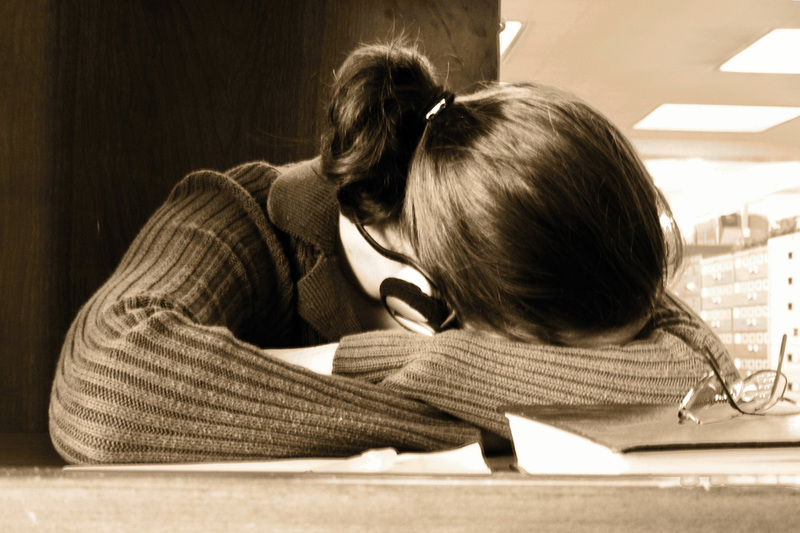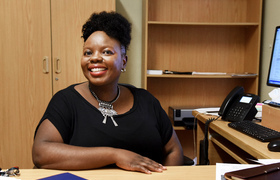Breaking the exam stress cycle
16 May 2019 | Story Supplied. Photo Kevin Zollman, Flickr. Read time 6 min.
This is a stressful time of year for many students, and finding a balance between studying and self-care will go some way towards easing your worries. However, if you need help to cope with the stress, it is available in the form of 24/7 phone counselling and at the various walk-in centres on campus.
When it comes to managing your stress, start by putting a study plan in place and try to stick to your timetable. Remember though that your studying will be less effective if you are exhausted and run-down. Sleep, exercise and nutrition top the list when it comes to taking care of yourself and ensuring that you are able to focus and concentrate.
Get enough sleep – seven to eight hours is advisable – in the weeks leading up to exams, as well as the night before an exam, to ensure that you are well rested. Sleep aids memory and improves the ability of your cognitive senses to function efficiently.
Regular exercise is also a good way to keep your brain sharp and help you feel more energised and less stressed. It doesnʼt have to be anything hectic; a walk around the block or from upper to middle campus instead of taking the Jammie shuttle should do the trick.
Eating healthy food also helps with alertness and focus. Sugary snacks and drinks may provide a quick boost but are inevitably followed by an energy slump, so theyʼre not a good idea. And avoid the temptation to drink too much alcohol or take drugs. If you need support in this regard, the Student Wellness Services (SWS) will be able to refer you to a group that suits your needs.
Stay healthy
Don’t wait if you feel you have a cold or other illness coming on. Consult a nurse at the SWS clinic, or visit one of the walk-in service points, and get the medication you need. After all, the sooner you treat the mild symptoms, the faster you will recover.
Likewise, if you notice a friend or classmate battling to cope or who is ill, encourage them to go to a doctor, the SWS clinic or one of the walk-in service points, or accompany them if necessary.
If you’re on medication for any condition, don’t stop taking it. Speak to your doctor if you are worried about side effects, such as drowsiness, but it is recommended that you continue with your treatment.
Too much stress
It’s normal to have a certain level of stress during exam time. Sometimes though, it can all feel a bit overwhelming and may affect your studies. That’s when you should seek professional help.
If you have financial concerns, ask for advice from the Finance office. If family life and pressures are worrying you, get help from the SWS social worker or counsellors to help you through your situation.
“If you feel depressed or anxious and constantly worried about everything in exams and beyond, my advice is to talk to somebody, do it quickly and get help,” says Dr Memory Muturiki, the director of the UCT Student Wellness Service.
“Even if you don’t think it’s serious, itʼs worth talking to someone.”
Ways to get help
- Phone UCT’s telephonic counselling service, the South African Depression and Anxiety Group (SADAG) UCT Student Careline toll-free number, at 0800 24 25 26. Students can also send an SMS to 31393 and a counsellor will call back. The call service is open 24 hours a day, 365 days a year. Trained counsellors will be on the line. UCT students can phone from wherever they are, on and off campus, and from anywhere in the country, during term times as well as holidays.
- SWS has set up a few walk-in service points on upper and middle campus, and on the Hiddingh and health sciences campuses. They are open between 08:30 and 16:30 from Mondays to Thursdays. At the Steve Biko building, students are able to take a tear-off slip with an available time slot, and then come back at the allotted time. At the other locations, no appointments are required but students must be prepared to wait their turn.
- If you need to be seen at the main clinic, you can book an appointment at the Student Wellness Service, in the Ivan Toms Building at 28 Rhodes Avenue in Mowbray.
- Practical after-hours help is also at hand for students living in residences on campus. The Department of Student Affairs (DSA) Crisis Intervention Service, popularly known as the night-nurse service, is available to help students in residences who may face a mental-health crisis after hours. This can be accessed by contacting Campus Protection Services (CPS) on 021 650 2222 or using the 24-hour toll-free number 080 650 2222 (you can use the toll-free number even if you don’t have airtime on your phone).
- ER24 Emergency is on standby for the university for any emergency at any time, and is able to dispatch an ambulance for you if necessary.
- If you’re off campus, the UCT Student Careline could be your first port of call. Phone emergency services if necessary and find help at a hospital in an emergency.
Useful Contacts
- SADAG UCT Student Careline 24/7 toll free: 0800 24 25 26.
- Students can also send an SMS to 31393 and a counsellor will call back.
- Student Wellness Service: Ivan Toms Building, 28 Rhodes Avenue, Mowbray; 021 650 1017/20.
- UCT Campus Protection Services: 021 650 2222
UCT Campus Protection Services toll-free number: 080 650 2222. - ER24 Emergency: 084 124 (if on campus via CPS).
- Emergency 107 from a landline and 112 from a cellphone.
- LifeLine Western Capeʼs Crisis Line: 021 461 1111.
 This work is licensed under a Creative Commons Attribution-NoDerivatives 4.0 International License.
This work is licensed under a Creative Commons Attribution-NoDerivatives 4.0 International License.
Please view the republishing articles page for more information.










